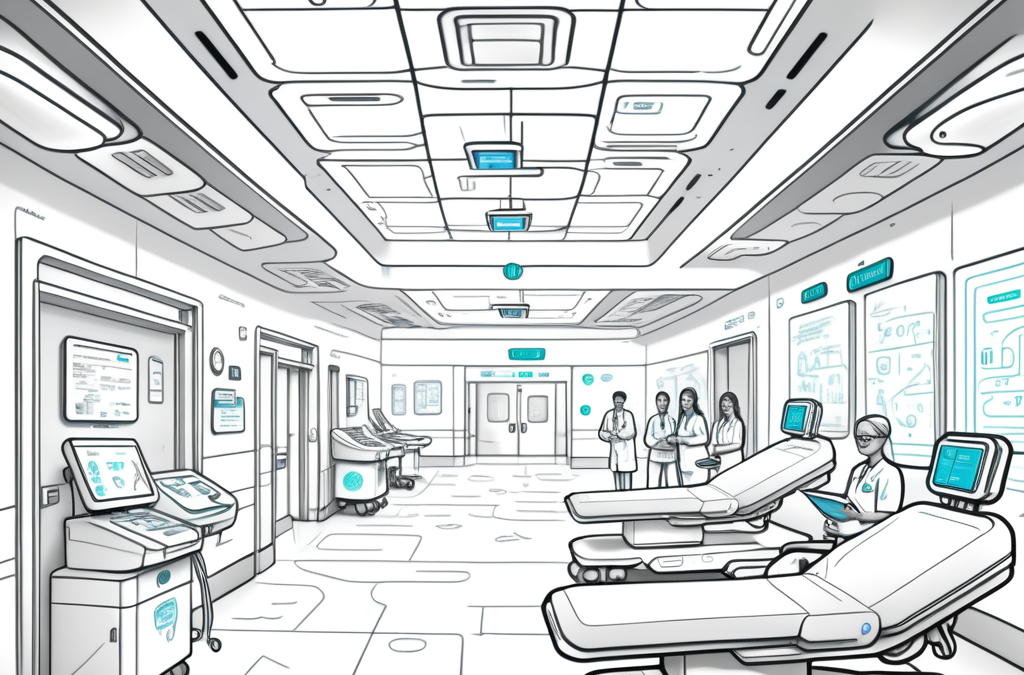Imagine waking up in a hospital where the atmosphere is tranquil, and the care is tailored to your unique needs. The doctor’s visits are more engaging, and the treatment plans are designed with your specific health goals in mind. Welcome to the era of AI-powered healthcare, where the focus is on enhancing the patient experience. Artificial intelligence is no longer a buzzword; it’s a reality that’s transforming the healthcare landscape. From chatbots to personalized medicine, AI is revolutionizing the way healthcare is delivered. This article explores the incredible impact of AI on patient experience and how it’s redefining the future of healthcare.
The Tech Behind the Transformation: Unraveling the Mystery of AI
AI is like giving machines a super-smart brain that processes vast amounts of information and makes decisions autonomously.
Key AI technologies shaping healthcare include:
- Machine Learning: AI systems learn from experience and analyze massive medical datasets to uncover patterns, assisting doctors with accurate diagnoses.
- Natural Language Processing (NLP): This allows computers to understand human language, powering chatbots that can answer health-related questions.
- Robotics: AI-driven robots support tasks such as delivering medicines, assisting in surgeries, and enhancing patient interactions.
These technologies work in harmony to enhance patient experiences, enabling quicker diagnoses, tailored treatments, and proactive health management.
Communication Revival: How AI Is Bridging the Gap Between Patients and Healthcare Providers
AI is revolutionizing communication in healthcare, making it easier than ever to interact with healthcare providers.
Imagine:
- AI Chatbots: Available 24/7, these friendly assistants can answer your health queries anytime, helping you understand symptoms or procedures without delays.
- Telemedicine: AI facilitates scheduling virtual appointments, enabling face-to-face consultations with doctors from the comfort of your home.
- Post-Visit Engagement: AI can send medication reminders and check on your well-being, acting as your personal health coach.
Moreover, AI helps simplify complex medical jargon, ensuring that you’re always informed about your health.
Personalized Medicine: The Rise of AI-Driven Healthcare
AI is creating a healthcare landscape where care is customized just for you.
Consider how AI personalizes care:
- Predictive Analytics: By analyzing your medical history and lifestyle, AI suggests tailored treatments, identifying potential health issues before they escalate.
- Unique Patient Profiles: AI compiles your health data into comprehensive profiles, allowing doctors to create effective treatment plans specific to you.
- Health Recommendations: AI acts as a personal coach, offering diet and exercise suggestions that match your preferences and goals.
This approach leads to more effective healthcare as treatments are designed with your unique needs in mind.
Empowering Patients: AI’s Role in Boosting Engagement and Satisfaction
AI is transforming health management into an engaging experience, encouraging active participation in your healthcare journey.
Features of AI in engagement include:
- Gamification: Health tasks are turned into exciting challenges, rewarding you for sticking to medication schedules or achieving fitness milestones.
- AI Health Apps: These applications analyze daily habits and provide personalized advice, acting as a mini-doctor in your pocket.
- Smart Reminders: Instead of generic alarms, AI sends tailored reminders that fit your routine, helping you adhere to treatment plans.
AI enables you to take charge of your health, transforming the patient experience into one that is interactive and rewarding.
Navigating the AI Landscape: Challenges and Considerations for a Smoother Patient Experience
While AI brings numerous advantages, it’s essential to address the challenges it introduces:
- Privacy Concerns: With extensive data analysis, safeguarding patient privacy is paramount. Strong security measures must be in place to protect sensitive health information.
- The Human Touch: The balance between AI efficiency and the empathy of healthcare professionals is critical. Technology should enhance, not replace, human interactions.
- Bias and Fairness: AI systems must be trained on diverse datasets to avoid perpetuating health disparities.
- Healthcare Professional Training: Ongoing training is vital for doctors and staff to maximize the benefits of AI tools.
Addressing these challenges will ensure that the integration of AI into healthcare is both beneficial and equitable.
The Future of AI in Healthcare: What Lies Ahead
The future of AI in healthcare is poised for extraordinary advancements. Envision:
- Nanobots: AI-powered nanobots could monitor our health in real time, detecting diseases before symptoms appear.
- Virtual Reality (VR): VR could be utilized for medical training and patient treatment, allowing for skill development and anxiety reduction during procedures.
- Personal Health Advisors: AI may evolve into a 24/7 health advisor, providing tailored recommendations at your fingertips.
- Digital Twins: Simulating treatments on virtual representations could lead to more personalized healthcare solutions.
However, maintaining a human element in healthcare will remain crucial as technology evolves.
Conclusion: Embracing the AI Revolution for Better Patient Experiences
The transformation in patient experiences through AI is just beginning. With AI, we’re not just patients; we’re empowered individuals taking control of our health. Innovations in AI promise a future where healthcare is more personalized, efficient, and effective. As we move forward, it’s essential to balance technology with the human touch, ensuring compassionate care remains at the forefront.
The AI revolution in healthcare is here, and it’s making a difference, one patient experience at a time. Embrace this change and look forward to a world where technology enhances your journey to health and happiness.


